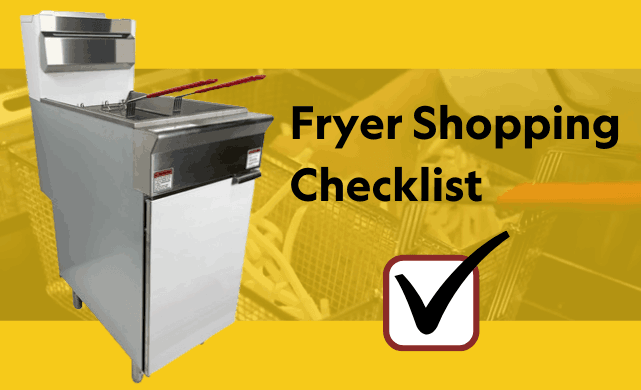Looking to change up your menu and bring some deep fried goodness to your clients? Adding a commercial fryer to your foodservice operation can add a new dimension to your menu and can help you gain some new patrons. Whether you’re planning on adding appetizers and sides like french fries and cheese sticks or expanding your entrees to include deep fried coconut shrimp and scallops, deep fried foods are popular and delicious if they are prepared correctly.
Like any commercial cooking equipment purchase, there are a few considerations you need to nail down before you start shopping so that you are looking at the right type of fryer before you start the buying process. Here’s a quick checklist to help you narrow down the field of commercial deep fryers for comparison.
What type or model of fryer suits your operation? Choosing between a floor model deep fryer or a countertop commercial fryer is usually a factor of floor space and usage. If you don’t have limited floor space and anticipate low volume of fried foods being prepared regularly then a countertop fryer is a good solution. For larger volume of fried foods going out of your kitchen, a floor model fryer is ideal and you may just need to find the room in your cooking line.
What type of power is available for your fryer? Do you have gas and electricity available in your kitchen or both? Gas fryers are more commonplace because natural gas is less expensive than electricity in most parts of the country. Keep in mind that a gas fryer requires a connection to the gas line in your operation and if you are required to add the gas hookup, you’ll have an additional expense when purchasing your fryer. If you need to transport your fryer for catered or outdoor events, a propane fryer will be your best choice. These fryers do not need a connection to any utility except the propane tank which you can carry with you. An electric fryer has the benefit of being easy to install and to move for cleaning. The cost to operate will most likely be more expensive than a gas fryer and you may need to consider having a backup generator on hand for any power outages so you don’t loose operation.
What size fryer is appropriate for your operation? The first thing to determine is how much capacity you will need from your fryer. The amount that a commercial fryer can produce is typically estimated at twice the amount of oil that the fryer contains. You would estimate that a 40 lb. fryer can produce between 60 and 80 pounds of food. Along with capacity, you need to consider the available space for your fryer. Countertop fryers are a good option if space is limited, but they aren’t a good high volume solution. When considering space for your fryer, be sure to add in 6” of clearance/additional space for the sides and back to enable air circulation.
What type of food will you prepare? Fried foods are generally broken out into two different categories: dry-coated or breaded and wet-coated or battered. The type of food you are frying is important in determining the right fryer for your application. Dry-coated foods usually produce more sediment in the cooking process. A tube fryer has a large sediment zone where the breading and food that falls off during cooking can settle but won’t get scorched, ruining your oil. Wet-coated foods produce far less sediment and are better prepared in a flat bottomed fryer where they can rise to the top when they are finished cooking. For more versatility, you may want to select a tube fryer or an open top fry which can accommodate most types of frying.
Can you meet the ventilation requirements? Be sure to check your local fire and safety codes before shopping to know the type of hood and ventilation systems required for your facility. A fryer should be located under a commercial hood system which removes grease, fumes and smoke from the air. This promotes a safety and keeps the working environment cooler as well as keeping carbon monoxide from building up in your foodservice kitchen.
Whatever type of commercial fryer you’re looking for, if you have any questions need assistance finding the right model to meet your needs, Cook’s is ready to help you with spec sheets, quotes and more.
